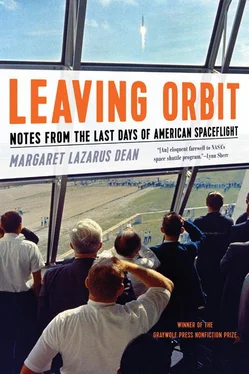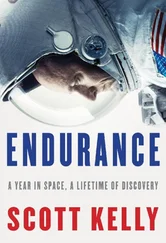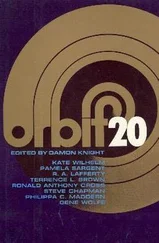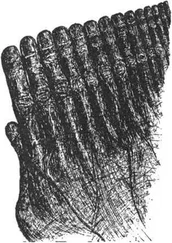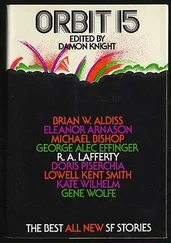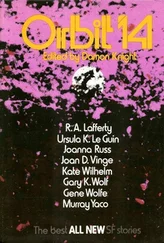Soon we start seeing real space fans, die-hard fans, who want to talk to Buzz about his time on the moon. After an hour, the line has barely moved; things are progressing slowly because every single person not only wants to have a book signed, each also wants the chance to meet Buzz, to speak with him, to get a picture with him. They all want to touch the moon hand. A lot of people in the line are of the right age for the space obsession born in childhood, but not all of them—plenty of autograph seekers are old enough to have already been adults when Buzz walked on the moon or young enough to have missed it.
Among those of the right age range, everybody wants to tell Buzz Aldrin where they were and what they were doing while he was walking on the moon. These stories are almost uniformly uninteresting, as stories about watching TV tend to be. Buzz Aldrin nods and smiles politely. He is so patient with these stories it’s easy to forget that he has been listening to them for forty years.
Some people bring objects they want Buzz to sign: a moon-shaped nightlight, the yellowed and brittle front page of a small-town newspaper with Buzz Aldrin’s face, along with those of Neil Armstrong and Michael Collins, under the enormous headline MAN WALKS ON MOON. A T-shirt with the NASA logo on it. A book about the planets published in the fifties. Buzz is not entirely consistent in his policy on signing these things—many times he simply takes the object and scribbles on it without comment, but other times he refuses—he’s here to sign his new book today, he explains to those people. One thing he is consistent about is Buzz Lightyear action figures. He signs them all happily. He even carries a special indelible pen that writes well on the white plastic of Buzz Lightyear’s thigh. The connection that ignites between Buzz Aldrin and the children who love Buzz Lightyear is truly adorable to behold.
Most people accept Buzz’s refusals politely and move on quickly. The professionals know that arguing or complaining will make no difference and could potentially get them blacklisted from future events; those who wanted his signature for themselves usually seem embarrassed and stammer out an apology.
But one woman argues with Buzz. She is middle-aged, with dyed red hair and a slightly harried look. She carries a huge autograph book under her arm. She doesn’t have a copy of Buzz’s autobiography, and holds the autograph book out to him instead. For a moment he seems to waver, but he sizes her up and signs the autograph book wordlessly. The woman watches him do it, lips pursed. She does not try to tell him where she was and what she was doing while he walked on the moon.
“I want to get the autographs of all the men who have walked on the moon in this book,” she says. “Do you know what is the best way to do that? Can I just mail it to people and ask them to mail it back?”
“Oh, I wouldn’t do that,” Buzz answers sensibly. “We all get a lot of mail and a lot of requests for autographs, and things can get lost. If you really want to get as many as you can, you could go to trade shows.”
“What’s that?” she asks suspiciously.
“They’re held at convention centers and such. They charge admission, and all of the astronauts set their own fees for autographs and memorabilia and what have you.”
“You mean you charge money ?” the woman asks, recoiling. I’m a single parent. I can’t afford to pay hundreds of dollars to go to these places and get these signatures.”
Buzz shrugs. “We all get a lot of requests for autographs,” he explains. “Some of us are reaching a point where we would think about saying no to everyone, and this is a way where we can do it where it’s a little more fair.”
“I don’t see how it’s fair ,” the woman answers as she takes her autograph book back from Buzz. I don’t know who else has signed it, but it’s now worth at least $500.
“I’m sorry to disappoint you,” Buzz says evenly. He may be sincere or completely sarcastic. He may be trying to get rid of her. This puts her over the edge, and she raises a single finger to lecture Buzz and me.
“I’m an American citizen ,” she says firmly. “I helped pay for the moon landings. I helped pay for your trip to the moon. Now I want the autographs of the astronauts I paid to send, and you’re telling me I can’t get them unless I pay them money?”
“Neil Armstrong won’t do it at all,” I put in. “He doesn’t make public appearances anymore.” She gives me a look of hatred before turning her attention to Buzz again.
Buzz apologizes noncommittally, and she wanders away. It’s an interesting question, actually. Surely we who help pay for spaceflight have a right to the knowledge and images that come out of those missions. But how much access to these actual human beings have our taxes bought us? For how many years, how many decades afterward do they owe us their autographs and their answers to the question, yet again, how it felt to walk on the moon?
Over the course of the afternoon, as the line slowly wanders its way through the courtyard, I hear Buzz Aldrin asked dozens of times what it felt like to walk on the moon. He does not have a pat prepared answer—he tries to answer sincerely each time he is asked, and the answer takes on different nuances each time.
We were really just focused on staying alive , he says to some people.
We had a lot of work to do so we didn’t really have time to reflect , he says to others.
The feeling of one-sixth gravity was a lot of fun but also challenging to get used to, so we really had to concentrate on doing our jobs and not falling on our faces.
When we got back, we sort of felt we’d missed out on the whole thing.
When Buzz Aldrin expresses frustration at not being able to describe his impressions of space as well as a writer might, his statement is, on one level, merely a polite thing to say when he is excusing himself from answering a tough question for the millionth time. But taken literally, it means something quite startling. It means that Buzz Aldrin envies Tom Wolfe and Norman Mailer and Oriana Fallaci, that—even more ludicrous—he envies me. Yet the thing we space writers have in common is the extent to which we admire and envy Buzz his experience of walking on the moon. We envy him so much that at times it’s hard for us to see Buzz at all, to see his accomplishment as something he did, a risk he took gambling against his own death, rather than simply as something we will never get to do.
Leading up to our day together, I’d tried to imagine what Buzz Aldrin would say about the retirement of the space shuttle. I anticipated that someone who has risked his life to walk on the surface of the moon probably thinks that the space shuttle, which can only reach low Earth orbit, has been a frustrating waste of energy and maybe a step in the wrong direction. But I would not have predicted that a conservative eighty-year-old Korean War veteran would support government funding for a massive science project as a general principle, or even less that he would support President Obama’s decision to cancel the Constellation project the following year, calling this “Obama’s JFK moment.”
It’s hard to reach conclusions about my day with Buzz Aldrin. One unavoidable fact: he is a pro at all this. Meeting hundreds of people who are in awe of him, people who ask the same questions over and over. The day I spent with him was an honor but also an exhausting ordeal—speaking to a packed auditorium, meeting hundreds of people, including several weepy and/or emotionally disturbed space enthusiasts. For Buzz and Lois, the event in Nashville was bracketed by two flights and followed by another event that same evening in another city. By the end of our day together, I was in need of a strong drink and a lie-down with a cold washcloth over my eyes, but Buzz was still going strong. He has had days like this nearly every day since he came back from the moon forty years ago. One can forgive astronauts like Neil Armstrong who found they simply could not take it and tried to disappear from the public eye. For his part, Buzz Aldrin is completely accustomed to being Buzz Aldrin and the fawning energy that generates itself around him, the way people want to have their pictures taken with him, the way they hold on to his hand a little too long.
Читать дальше
